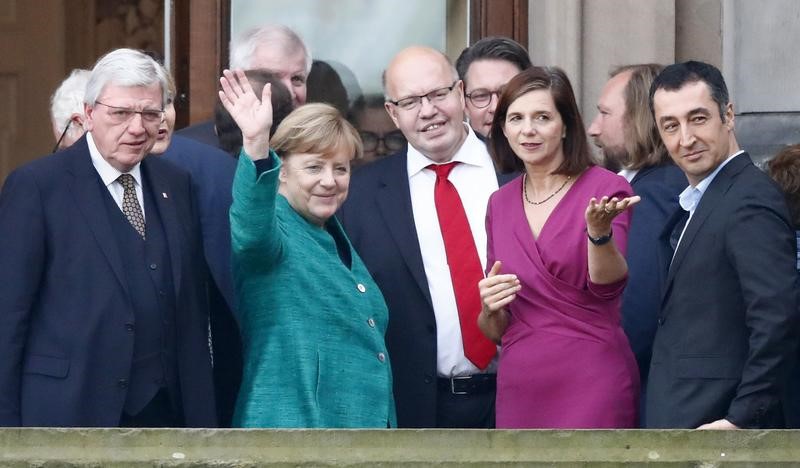BERLIN (Reuters) - Chancellor Angela Merkel won a fourth term in office in the German national election on Sept. 24, but a fractured vote that brings the far-right into parliament means she must try to work out a three-way coalition untested at federal level.
The new alliance would comprise Merkel's conservative bloc - her Christian Democratic Union (CDU) and the Bavarian Christian Social Union (CSU) - along with the pro-business Free Democrats (FDP) and environmentalist Greens.
Such a tie-up is called a "Jamaica" coalition, because the three parties' colours of black, yellow and green match those of the Jamaican flag.
To secure a coalition deal, the unlikely bedfellows must overcome differences on issues from immigration to Europe, tax and the environment.
Exploratory talks between the conservative bloc and FDP and separately the conservatives and the Greens took place on Wednesday. On Thursday the FDP and Greens meet before all four parties get together for the first time on Friday.
Following are remarks on the possible coalition from senior officials:
PROSPECTS FOR A JAMAICA COALITION:
ANGELA MERKEL (CDU)
"We will not manage without compromises."
PETER ALTMAIER (CDU)
"My impression is that all the participants want the experiment to succeed but also know how difficult it is to come together."
"It is our job to make something constructive out of our differences. No formulaic compromises but solutions."
ANDREAS SCHEUER (CSU)
"The road to Jamaica is long.'
After CDU/CSU, FDP exploratory talks:
"It was a good exchange, at times nice and above all mutually respectful and joyful."
PETER RAMSAUER (CSU)
"It is totally conceivable that before Christmas or in January we say that the whole thing is pointless and we'll talk to the Social Democrats (SPD).
CHRISTIAN LINDNER (FDP)
"We are open, we are constructive and creative - but also resolute in areas that are important to us." Put the chances of a 'Jamaica' coalition succeeding at 50/50.
WOLFGANG KUBICKI (FDP)
"It can succeed. The most important thing is that trust needs to be built between participants, and that takes time. That's why it would be illusory to believe we could conclude negotiations by Christmas."
IMMIGRATION:
CEM OZDEMIR (GREENS)
"No one would understand it if the new government does not pass an immigration law.
"We need a mix of humanity and order. We Greens also want to secure the EU's external borders and build a sensible database of fingerprints.
SIMONE PETER (GREENS)
"This (the CDU/CSU immigration pact) is an agreement between the CDU and CSU, and far from the result of exploratory talks for a coalition with the FDP and Greens."
GUENTHER OETTINGER (CDU)
"No party can expect the others to accept its original wording without changes ... But I believe that a signal about limiting immigration on humanitarian grounds will ultimately make its way into the coalition agreement."
EURO ZONE FISCAL POLICY:
SIMONE PETER (GREENS)
"Europe's fiscal policy needs a shift away from austerity toward a common pact for tax collection and investments, which would trigger social and ecological innovations."
CHRISTIAN LINDNER (FDP)
"A red line for us in coalition talks is the mutualisation of debt in Europe, the creation of new pots of money.
"In a monetary union where the deficit rules of Maastricht are respected, there is no need for permanent rescue funds."
ENVIRONMENT:
GUENTHER OETTINGER (CDU)
"What we Christian Democrats call 'preservation of Creation' overlaps a lot with what the Greens call a sustainable approach to nature."
TAX:
CHRISTIAN LINDNER (FDP)
"There can only be a Jamaica tax concept if it includes the end of the solidarity surcharge without taking that money out of people's pockets somewhere else."
FINANCE MINISTRY:
CHRISTIAN LINDNER (FDP)
"The chancellery and the finance ministry should be politically separate. A Greens, a CSU or an FDP finance minister - anything would be better than leaving the finance ministry in CDU hands."
